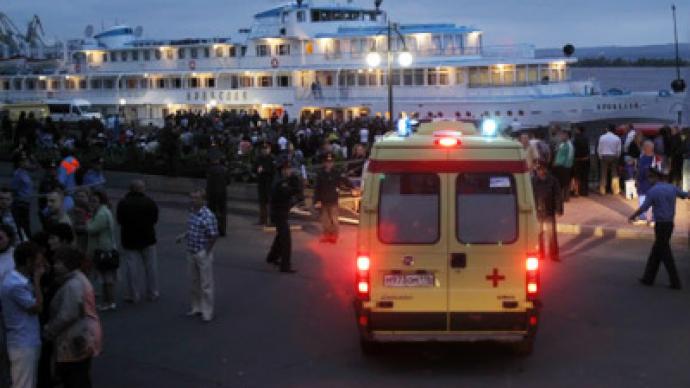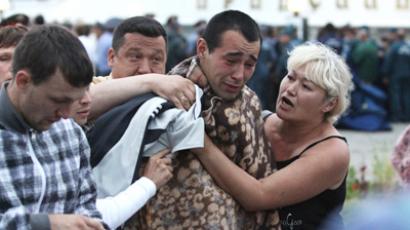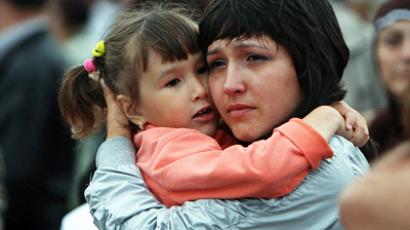"Only one family survived the wreck without losing any members"

RT spoke to Roman Lizalin, the captain of the vessel Arabella, which rescued all 77 survivors from the cruiser Bulgaria. The latter boat sank on Sunday, killing at least 113 people, including 27 children, while over a dozen remain missing.
RT: Captain Lizalin, thank you very much for this interview. Your ship was the first to come to the rescue of the sinking cruise ship Bulgaria. How did you become aware of the tragedy?Roman Lizalin: Yes, we were the first to help. We were sailing in the same direction as the Bulgaria, and we picked up on the radio just bits of conversations between some ships, we couldn't make out what the ships were, but we heard them talk of seeing people overboard and speculating that it looked like a boat or a small ship had capsized. Once we heard that we put on more speed to get there faster. When we did arrive at the tragedy site we saw terrible things, and only when realized that it was the pleasure boat Bulgaria that had sunk did the true scope of the disaster strike us.RT: How long did it take you to get to the scene?RL: I would say about five to 10 minutes, 15 at most, from the moment we heard the radio talk. It all happened very quickly. As we were nearing the site we began to figure out how many people there were in the water, although that was hard to do because there was a lot of debris floating around as well. It was very hard to pick out individual people from among the floating debris. It was a truly tragic picture that we saw. RT: What condition were these people in? Were they panic-stricken? What were they saying?RL: When we got them on board we had so much to deal with – of course they were panic-stricken, they were in deep shock. What happened was quite horrible, my crew members who were involved in rescue works became deeply involved too. Some people were in a dreadful condition, many were injured. They had oil all over their skin because when the ship sank the fuel-oil came up to the surface and spread everywhere and covered them. That made the rescue even harder because the oil made the victims greasy and hard to get a hold of to pull them on board. Seeing children in that condition, that was particularly heart-breaking. RT: And it was probably very hard on survivors who had lost family members in the tragedy…RL: As far as I know – although it may be wrong – I understand that only one family survived the wreck without losing any members. Most people did lose their close and loved ones, and yes indeed, it was very hard both on the survivors and on us, too. We all felt very deeply for them. RT: Right, and I was just about to ask how your crew were coping with it at the time, and how they are doing now? It must have been hugely stressful. RL: At that moment we couldn’t afford to think about stress, we had to do all we could to prevent panic from spreading. Of course, each of us felt it deep inside, but we had to remain calm and professional, to control our feelings. RT: You succeeded in saving so many people, a total of 77. What helped you do that, was there anything in particular that helped?RL: You know, I find it hard to say what helped us, because after that storm there was a brief period of calm and it happened just as we approached the wreck site. That short moment of calm allowed us to pull people on board. Once the rescue operation was over and we went to investigate the wreck site again, the rough weather came back and the water was very rough again. We got there just in time. As for the crew, well I already said that they performed in the best possible way. Everyone acted very competently. The speed of the crew significantly helped save people’s lives. They just wanted to get the job done.RT: How many passengers were on board at that time and how did they react?RL: The Arabella was packed to full capacity at the time – 150 passengers. They acted like heroes. I use this bold word deliberately. They helped out a lot, they consoled the injured and there were doctors among the tourists on the Arabella, they assisted the ship's medic as he rendered first aid. And they gave a lot of psychological support to survivors – that was very important.RT: The people who survived the shipwreck told the journalists that when they found themselves in the water and the boat sank, they were instantly pulled under the water after the wreck and then popped up to the surface again. One observer said he thought it looked as though the sinking boat formed a sort of funnel that pulled everything in. What happens in reality?RL: Of course, a sinking boat can pull objects floating on the surface under the water because of the huge water displacement. That churns the water into a whirlpool that can suck people in. But people who were afloat when the ship sank must have found enormous strength to fight the whirlpool and return to the surface. It is difficult to tell because I have never been in their shoes. And I can't just imagine what it would be like.RT: Had they been in the water for long before you picked them up?RL: I can't be precise about that, but I think they were in the water for half an hour or so. Some of them had tried to get into life rafts; others were still in the water.RT: There are a few theories of how this tragedy could have happened and one of them is that the boat had technical defects. You saw the Bulgaria in dock some time before the sinking. Did she look defective to you?RL: You see, not all technical defects can be seen from outside. Experts say that the cruiser listed to one side. I don’t know how dangerous this was for the passengers because I’m not familiar with ships of this type. I’ve never worked on that design. But it listed, and everyone knows about it. And as for the technical state of the cruiser, I say again that I can't pass judgment because I never inspected its engines. It is very difficult to tell if you don’t know the particulars.RT: There are eyewitnesses who insist that the boat listed to port even when it was docked at the wharf. Is it true that the listing was visible? RL: I told you just now that there was certain listing, but I can't tell how critical it was to the ship.RT: Did you happen to talk with the crew of the Bulgaria before the boat sailed? What were they thinking? Did they consider the possibility that something might happen? Did they tell you about it?RL: When the Arabella docked at Bolgar – it was one of the planned stops – we occupied the second berth while the Bulgaria was tied at the first one. They were leaving at 11 o'clock and we stayed till 1pm. When they were sailing off we had to maneuver in order to let the boat out and continue its cruise. When we berthed in the morning, I went ashore and spotted the former captain of the boat and the current second mate of the Bulgaria, Vladimir Nazarov, in the center of the main deck. He had worked with the Bulgaria from the very beginning, back in the times when she was called Ukraine. He was the captain of the Ukraine. But old age prevented him from remaining in charge because it is an exhausting post. The captain works very hard and it's too tiring for an old man. He realized this and decided to step down to the mate position because it is easier and better for an older man. He did not want to leave the Bulgaria-Ukraine, his mother ship. And I approached him and we chatted a bit. We shook hands and I asked him, "Mr Nazarov, aren't you tired of sailing at your age?"And he told me with this sadness, you know, that he’s got nothing to do at home, his wife had passed away a few years ago, and all that was left for him as a consolation was his job. But the most memorable thing he told me, one that stuck in my mind, was when he said he didn’t want to sail this year. I don’t know… He just didn’t feel like sailing this season. And then this thing happened.RT: I assume from the way you are telling this story that he is no longer alive. RL: That’s right. Sadly, he is gone. His body was recovered and identified. It is such a pity: He was a good man, and a true captain. Such a pity.RT: Is it true that the ship sank really fast?RL: Yes. You know, I’ve spoken to some of the witnesses – I mean survivors. Of course, they all have different versions, but I attribute this to shock, because they just couldn’t get their thoughts together and were rather confused. But they still say it took the ship something like two or three, maybe five minutes to sink. And that really is a very short time, and it is difficult to lower any boats or rafts in the meantime with a strong lurch like that, or brace up somehow. And that suggests how it is possible that the accident could claim so many lives, because it all happened so fast. RT: Let us talk about these two vessels that, as many claim, passed the Bulgaria. Did they really just pass by? Why didn’t they stop? Did they see what was going on?RL: I saw…well, we were approaching the site of the tragedy practically simultaneously with one other vessel: A heavy-duty tug boat with a large barge. Maybe it was a little bit ahead of us. I don’t know why they didn’t stop in front of the site if they saw it happening, and I can’t say whether they saw it at all, either. But by the time they decided to halt and come to the rescue, we were already there – I don’t know, maybe it was because of that ship’s mass characteristics and momentum, maybe they had tried to stop earlier than that. Anyway, at that moment we were there, and that ship’s presence at that spot could be counterproductive and hazardous for the people who were in the water and below the surface. In that situation, it was paramount that we avoid panic and assess the situation. It was necessary to observe the scene of the accident, and it was necessary to start rescuing people immediately. But anyway, I think we did it all faster than this other ship could have, because at that moment, there was just so little time. RT: Did you have radio contact with them?RL: We had contact, but we just exchanged a few phrases. I merely told their captain that it was pointless for him to try to rescue anyone at the moment, and asked him to move ahead a little so as not to impede our rescue operation. At that moment there was no use for his help, that’s what I can tell you. Maybe if it had been rendered earlier, it could have come in handy, but at that time, there was no point in it. RT: I understand that you don’t want to blame anyone, but at that moment, it was already too late. He should have reacted earlier. RL: He would have to halt the ship, lower a boat. But we were already approaching the site in our ship. I already had boats afloat and advancing toward the site. And his boat – what could it do? We were practically beginning to collect the people from the water. Once again, I’m not trying to accuse him – I don’t know his vessel’s mass and momentum characteristics. Maybe he needed much more time to stop his ship and lower a boat. I wouldn’t rule that out. I was just assessing the situation realistically at that moment, and I figured that there was no use for his boats there at the time, you see. RT: Was he supposed to obey your orders in that situation or not?RL: Of course not. I am the captain of one ship. He is the captain of another ship. I couldn’t give him any orders or instructions, because he doesn’t report to me. And now some people in the press are already twisting the story, saying I ordered him not to stop. RT: If the situation had been reversed and you had been the captain of the other ship, and were told that you should move on and your help was of no use – what would you do?RL: I can’t imagine myself as captain of that ship. I don’t want to offend anyone. It’s just that I don’t know what I would do if I were in his shoes at that moment. But if I had seen all that happening right in front of me, or simply saw people overboard, I swear I would have done the same as I did while on my ship.














